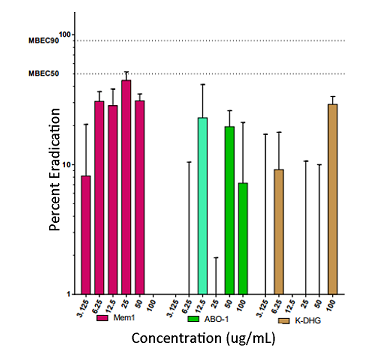Competitive Advantages
- New natural products and derivatives that are effective at eradicating Methicillin-resistant Staphylococcus aureus (MRSA) and Acinetobacter baumannii biofilms
- Not cytotoxic to mammalian cells
Summary
Biofilms are formed by all bacterial species. In the context of human disease, biofilms are the driving force behind many chronic infections, including UTIs, upper respiratory infections and periodontitis. Biofilms also form on implanted devices, such as catheters, artificial joints, pacemakers, and pins/plates. Interventions strategies targeting multi‑drug resistant biofilms would save numerous lives and significantly limit morbidity. Therefore, there is an urgent unmet need to develop molecules that can actively impact cell viability with biofilms.
USF inventors have discovered that the Antarctic sponge Dendrilla membranosa produces natural diterpene metabolites, that can eradicate bacterial biofilms. They discovered that these metabolites and their derivatives are effective in eradicating the biofilms of Methicillin-resistant Staphyloccocus aureus (MRSA) and Actinetobacter baumannii. This bypasses one of the main factors in bacterial drug resistance. The antibiofilm terpenoids were also tested against mammalian cells, and showed no signs of mammalian cytotoxicity. These metabolites can be used to decrease resistance in bacterial infections while also keeping the human host safe from harm.

Minimum Biofilm Eliminating Concentration (MBEC) of 3 Dendrilla Metabolites
- License
- Sponsored Research
- Co-Development